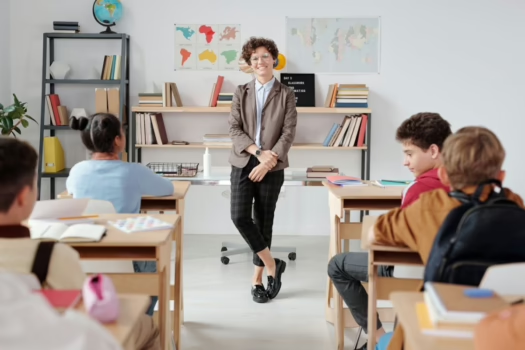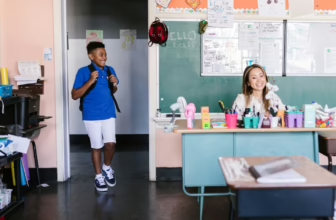Working with students who learn differently requires compassion, patience, and specialized training. Special education focuses on helping children with diverse learning needs succeed academically and personally. Many people with teaching backgrounds or a bachelor’s degree in a related field are exploring advanced study to gain deeper insight into inclusive teaching practices. Earning an advanced qualification helps them strengthen classroom management, assessment, and communication strategies. With flexible and interactive learning formats, students can balance their studies with existing responsibilities. As the demand for qualified special educators continues to rise, more people are choosing this rewarding path to make a lasting difference in students’ lives and their broader communities.
Here's how you can excel in your special education career:
Understanding the Purpose of Special Education
Special education serves students who require tailored instruction to meet unique learning goals. It aims to provide every learner with access to an equitable educational experience. Teachers in this field often work with children who need additional support in communication, behavior, or academic development. They collaborate with families and specialists to design strategies that encourage steady progress. The role involves fostering confidence, curiosity, and independence while adapting lessons to meet each student’s strengths. This work requires empathy, patience, and adaptability, making it one of the most meaningful paths within the teaching profession. Ultimately, it’s about seeing potential where others might see limitations and nurturing it to help students succeed.
Advancing Through Higher Education: Building Expertise for a Meaningful Career
Advanced programs can help you acquire skills to excel in your field. At William Paterson University (WPU), the program for teaching students with disabilities prepares future teachers for a truly impactful profession. The Master’s in Special Education online program helps participants build both practical and theoretical understanding of diverse learning environments. Through courses in assessment, behavioral support, and curriculum development, students learn to apply proven techniques that promote inclusion. The program also explores adaptive instruction, classroom collaboration, and evidence-based strategies for fostering engagement. Designed for working teachers, its flexible structure allows them to study without interrupting their current roles. The faculty combines research with real-world experience, helping students strengthen their teaching style, expand career options, and positively influence the future of inclusive learning.
Why This Career Path Truly Matters
Choosing to specialize in this field means dedicating oneself to creating equal opportunities for every learner. Special educators are often the bridge between students’ potential and achievement. Their work extends beyond academics. They support emotional development, communication, and daily life readiness. The role encourages understanding differences and shaping lessons around individual strengths. Many find it personally fulfilling because they witness growth that changes lives. This profession contributes to more inclusive classrooms and compassionate communities. Beyond teaching, it represents a commitment to fairness, empowerment, and long-term social improvement. These are values that continue to inspire many to join this meaningful path of service and impact.
Key Skills Gained Through Advanced Study
Those pursuing advanced training in this area develop core abilities such as communication, collaboration, and critical thinking. They learn how to identify learning barriers and apply strategies that help students thrive. Coursework strengthens knowledge in instructional design, classroom adaptation, and behavioral intervention. Students also gain experience using data to inform teaching plans. These lessons help them create environments where learners feel valued and supported. With a focus on inclusivity and teamwork, graduates become more confident in addressing challenges and guiding others. The result is a well-prepared teacher who understands how to make education accessible and meaningful for every student, regardless of their learning differences or background.
The Growing Need for Special Education Professionals
Schools and learning centers increasingly need educators trained in inclusive teaching. As awareness of learning diversity expands, so does the demand for those who can adapt lessons and create supportive environments. Many regions now recognize the importance of smaller class sizes, targeted instruction, and emotional support for students who learn differently. Advanced study gives teachers the preparation to step into these roles confidently. Those who complete such programs often find a wide range of opportunities, like teaching, curriculum development, and advisory positions. The field continues to evolve, opening pathways for teachers who are committed to guiding students toward independence and success in life.
Empowering Students with Evidence-Based Teaching Methods
Modern teaching approaches emphasize data-backed techniques that help students progress steadily. Educators learn to design lesson plans using tested instructional frameworks. They evaluate each learner’s progress and adjust methods based on measurable results. This strategy supports students in reaching achievable goals while promoting confidence. Many programs now combine traditional coursework with applied practice, giving participants the chance to implement what they study in real classrooms. Evidence-based instruction focuses on consistency, reflection, and accountability, which are the qualities that build trust between teachers, learners, and parents. By applying these structured methods, educators can create classroom settings where all students feel empowered to grow academically and emotionally.
Special education is more than a profession. It’s a meaningful commitment to equity and inclusion. Those who pursue this field discover that every lesson taught has a ripple effect, building stronger, more compassionate communities. Advanced study equips them with the insight and confidence to meet diverse learning needs and lead positive change in classrooms and beyond. As the need for qualified educators grows, so does the opportunity to make an enduring difference in the lives of countless learners. Choosing this path is a step toward meaningful work that continues to impact lives long after the lesson ends.
Follow me down the rabbit hole!
I'm Alice and I live with a dizzying assortment of invisible disabilities, including ADHD and fibromyalgia. I write to raise awareness and end the stigma surrounding mental and chronic illnesses of all kinds.








